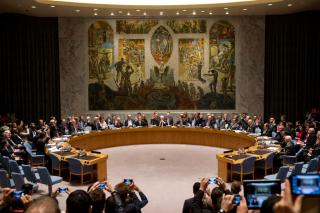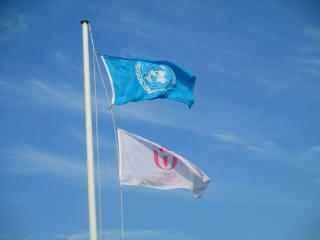The United Nations - It's Your World
By Allison Hess
Over the last few years, I have felt myself going back and forth between waves of fear, anger, sadness, shame, and mourning when I read the news. With each breaking news alert, I brace myself for another wave. When was the last time I got a breaking news alert that contained good news? I can’t remember. Is this to say that there is no good news to speak of? Of course not. There’s just not as much of it and, it’s not deemed to be as urgent as some of the more tragic announcements we do hear about.
So this past summer, when the United Nations adopted a Treaty on the Prohibition of Nuclear Weapons, rather than get a breaking news alert you had to flip deep into the middle of the newspaper (or scroll pretty far down in the app) to find any mention of it whatsoever. Why aren’t huge United Nations victories celebrated or at least remarked upon by the press? Some say the United Nations doesn’t matter, and perhaps the publishers, looking for clicks and shares, realize that the UN is rarely a high priority for U.S. readers.
But the UN is more important for us and for the world than ever. And I’ll tell you why:
We need hope. We need inspiration. We need to know that many others in the world are also working for peace and justice. The UN gives us something to aim for and keeps us going because we know that the rest of the world is right alongside us. The UN is not perfect. It has not yet achieved its stated mission, as articulated in the UN Charter: to “save succeeding generations from the scourge of war.”
I am a lifelong Unitarian Universalist and, for the past 3 years have been working in the Unitarian Universalist Association’s United Nations Office. Perhaps more than others, I am prone to thinking about the United Nations in religious terms. Like our faith, it has articulated goals and principles that its Members have covenanted to strive towards living into.
The preamble to the UN Charter asserts a determination to “reaffirm faith in fundamental human rights, in the dignity and worth of the human person, in the equal rights of men and women and of nations large and small…”
Through our First Principle, Unitarian Universalists covenant to affirm and promote the “inherent worth and dignity of every person.”
But sometimes we fail. Our congregations that claim to be welcoming and open often fail to truly live into this Principle when it comes to those who don’t fit squarely into the dominant white-cis-hetero-middle class culture. And so, our communities and congregations are embarking on deep explorations of how to dismantle white supremacy in all its forms by holding teach-ins and engaging in Beloved Conversations. When an organization does not live into its own expectations, the solution is not to abandon it, but to work with it, to expand and amplify the good parts, to repair and replace the bad.
The same is true for the United Nations.

The United Nations Security Council meets at the UN’s New York Headquarters and is responsible for maintaining international peace and security. Fifteen Members make up the Council, including 10 countries elected for two-year terms, and 5 permanent members.
The United Nations is in itself an aspiration. It is an aspiration for a world community with peace, liberty, and justice for all. If, as articulated in the Unitarian Universalist Sixth Principle, we covenant to affirm and promote “the goal of world community with peace, liberty, and justice for all”, we must invest in making the United Nations as effective as it was created to be.
On Tuesday, October 24, 2017, we will celebrate UN Day on the 72nd anniversary of the signing of the UN Charter and the founding of the United Nations. The UN has accomplished much over the course of almost three quarters of a century. It is easy to recognize the importance of the lifesaving work of UN agencies such as the UN Children’s Fund (UNICEF), the UN Refugee Agency (UNHCR), the World Health Organization (WHO), but people are quick to negate, ignore, and/or dismiss the accomplishments of the policymaking bodies of the UN.
By bringing the world together to set goals, and share resources and strategies for achieving them, the UN sets an example of inspiring partnership. However, we can see from the structure of the UN Security Council that the “equality… of nations large and small” articulated in the Charter is not being respected, since the five permanent members (P5) – China, France, Russia, the United Kingdom, and the United States – each have the power to veto any proposed Security Council resolution. There is significant room for improvement.
Since the creation of the UN in 1945, there has been no world war on the scale of those seen in the first half of the twentieth century. However, it is also clear that “the scourge of war” is still very much present on our planet. Mechanisms do exist for conflicts to be resolved via diplomacy and negotiation, yet many modern conflicts occur not between two separate nations, but within a country, caused by oppression of certain groups or lack of access to resources. We as a civil society must work to address the root causes including how to combat inequality and human rights violations, and how to ensure that our countries invest in disarmament over militarism. As former UN Secretary-General Ban Ki-moon frequently said, “the world is over-armed and peace is underfunded.”
The United Nations is absolutely at the forefront for progressive movements in human rights, peace, and addressing climate change. In 2015, the UN Framework Convention on Climate Change (UNFCCC) brought together countries, businesses, and civil society to create the Paris Agreement to confront the global threats of climate change. Even though some entities, such as the current U.S. administration, are working to worsen rather than mitigate climate change and derail the Paris Agreement itself, there are other bodies including local governments and nonprofit organizations & private companies who are setting their own policies and making meaningful strides towards achieving some of the goals set forth in the Paris Agreement. It is not enough. National governments must be actively invested as well, but the United Nations, while formally an organization for world governments, is also a venue where civil society can have an enormous impact.
This year’s Nobel Peace Prize was awarded to ICAN, the International Campaign to Abolish Nuclear Weapons. As a global network of peace activists and organizations, ICAN played a pivotal role in bringing world leaders together to create the Treaty on the Prohibition of Nuclear Weapons, adopted July 7, 2017, by 122 countries. In collaboration with UN Member States, civil society played a huge role in the negotiations for that treaty.
The same can be said of the UN Sustainable Development Goals. The goals are extremely ambitious, with specific goals relating to all aspects of development from eliminating poverty, to improving accountability and justice systems. Ambitious goals are a good thing. The UN has seen success in the past with the Millennium Development Goals, which hardly anyone had even heard about until only a few years before they were set to end in 2015. Just imagine how much progress we can make as a planet towards these goals if we truly take them on and work towards them. The first step is to understand that we are all global citizens and it is up to us to make our world a better place.
The UN is thought by most Americans as an outdated, ineffective institution. That is a mistake. The UN has more compelling power than most of us understand, as President Trump is finding out. As much as Trump wants to leave the Paris Climate Accords and the UN deal with Iran on its nuclear weapons program, he’s finding the binding power of UN agreements more difficult to break away from then he or most of us imagined. What happens at the UN matters and it changes the world, mostly for the better.
As the United States administration’s commitment to promoting a progressive agenda at the United Nations backs down, the voices of non-governmental organizations such as the Unitarian Universalist United Nations Office becomes all the more essential.
We all need something to think about when we’re feeling hopeless about the violence, greed, and illness that plague our world. The Sustainable Development Goals are one of the things I think about. The SDGs are goals for the whole world to work on together. They were agreed upon unanimously in 2015 by 193 countries. And if we all work towards them, in global partnership, between now and 2030, we can get closer to achieving that goal of world community with peace, liberty, and justice for all.
Let’s do it.

